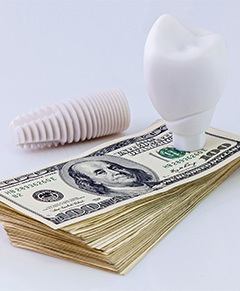Dental Implants – State College, PA
Rebuilding Flawless, Healthy Smiles for Life
Did you know that around 178 million Americans are missing at least one tooth? If you’re part of that statistic, you may not think that replacing missing teeth is a big deal, especially if the gaps in your grin are not noticeable. However, nothing could be further from the truth. On top of affecting your appearance and self-confidence, leaving an empty space causes your other teeth to shift, which leads to bite alignment issues. In addition, your remaining teeth have to bear more chewing force, putting them at risk for excessive wear, cavities, and gum problems. Fortunately, by replacing your missing teeth with dental implants, you can protect your smile from further damage. If you'd like to find out how dental implants in State College, PA can benefit you, contact us today. Dr. Kevin Labosky has over 20 years of experience as a restorative dentist and will create the perfect treatment plan for you!
Why Choose Kevin P. Labosky, DMD for Dental Implants?
- Partnered with a Network of Top-Rated Dental Implant Specialists
- Works with U.S.-Based Dental Labs
- Reasonable Pricing with No Hidden Fees
What are Dental Implants?

A dental implant is actually made up of three parts:
- A titanium post that is inserted into the jawbone via a surgical procedure
- A metal abutment fixture that fastens on top of the implant
- A custom-made restoration (dental crown, bridge, or denture) designed to mimic the appearance of your original teeth
Dental implants are the only tooth replacement that can rebuild the entire structure of a lost tooth. As a result, they end up looking and feeling more like natural teeth than any other solution currently available. That’s why Dr. Labosky usually recommends dental implants for our patients with missing teeth.
The Dental Implant Process

If you’re considering dental implant-supported tooth replacement, you should know that the process is complex and can include multiple phases. The entire treatment can take several months, but the end results could potentially last for decades, making dental implants well worth the time for many patients. Dr. Labosky will be able to come up with a more detailed and personalized treatment plan at your consultation, but the four basic steps of the dental implant process are as follows.
Initial Dental Implant Consultation

To get started with your tooth replacement journey, you’ll visit us for a dental implant consultation appointment. We’ll examine your smile, review your health history, and discuss any past experiences with surgery and anesthesia. We may also need to perform one or more preparatory procedures – such as tooth extractions, gum disease therapy, or bone grafting – to ensure your mouth is ready to accommodate the implants.
Dental Implant Surgery

For the surgical placement of your implants, Dr. Labosky will refer you to one of his trusted specialists in the State College area. That way, you can trust that you’ll be receiving the highest quality of care possible.
After numbing your mouth, the oral surgeon will make a small incision in the gum tissue. Then, the implant post is positioned into the jawbone. A cap is attached to the implant to protect the surgical site as it heals while also preserving the shape of the gum tissue until the replacement tooth is attached.
Dental Implant Osseointegration/Abutment

After implant posts are placed, it can take several months (usually three to six) for the implant to fuse with the supportive bone and gum tissues. This process is called osseointegration. Once the osseointegration process is complete, we attach the abutment, which anchors the replacement tooth to the implant post.
Delivery of Dental Implant Restorations

After the abutments are placed, we capture impressions of your prepared smile that will be used to design and craft your dental crown, bridge, or denture. Our dental lab uses the bite impressions, X-rays, and our smile design to custom craft your replacement tooth or teeth. Once this final restoration is received from the lab, you’ll return for your final visit with our team, so we can affix the replacement tooth or teeth to your dental implant posts, giving you back your picture-perfect smile.
Benefits of Dental Implants

Before you begin your dental implant tooth replacement plan, you may be wondering whether or not this complex treatment is worth the lengthy restoration process. We truly consider implant prosthetics to be the gold standard in tooth replacement. Some of the many benefits that make these treatment options so effective include:
Day-to-Day Benefits

- Improved Stability – If you’re tired of dealing with a denture that is constantly becoming loose and shifting out of place, you’ll love dental implants. They are incredibly secure, ensuring you won’t have to worry about your tooth replacement giving you issues. No longer do you need to worry about your teeth falling out when performing basic tasks.
- Comfort – Dental implants replace the missing tooth roots, mimicking the natural structure and function of your lost teeth. This guarantees your comfort and avoids unnecessary pressure on and damage to surrounding oral structures.
- Confidence – Once your dental implants are placed, you can expect to speak and smile with total confidence in just about any situation. This is especially the case if you intend on replacing teeth with either an implant bridge or implant denture.
- Easy At-Home Oral Care – Caring for your dental implants feels almost indistinguishable from your natural teeth. Simply brush twice a day and floss daily to keep your tooth replacement clean and free of plaque and bacteria.
Health Benefits

- Enjoy Your Favorite Foods – Traditional dentures only give you back about 20% of your chewing ability. That means you can’t eat as many tough or chewy foods. Dental implants function much more closely to natural teeth, allowing you to consume all of your favorite foods like steak, apples, nuts, and vegetables!
- Better Nutrition – The key to a healthy life is a healthy diet, and dental implants are prepared to keep up with your active lifestyle. Getting your daily dose of nutrients on a regular basis is substantially easier when tooth loss isn’t holding you back.
- Prevent Future Tooth Loss – The moment a tooth is lost, your risk for losing additional teeth only goes up dramatically. This is due to the bone tissue inside the jaw deteriorating, causing a breakdown of the foundation teeth rely on. The prosthetic roots of dental implants work to stimulate jawbone tissue as you chew, preventing the bone from atrophying.
Long-Term Benefits

- Long-Lasting – Implant restorations can last for three decades or longer compared with traditional restoration options that need to be replaced every ten years. This also makes them a more cost-effective solution for replacing teeth.
- Keep Natural Teeth in Place – A common side effect of tooth loss is remaining teeth tend to shift out of place in order to compensate for the newly created gaps. Placing dental implants ensures that your existing teeth stay where they are and keep the bite even.
- High Success Rate – When placed by a professional, dental implants hold a very high success rate. In fact, their average success rate generally falls between 95% and 98%, making them extremely reliable.
Who Dental Implants Can Help

The number of dental implants and the type of restoration we recommend will depend on your unique situation, specifically the number and location of your missing teeth. While every case is unique, we will typically recommend the following:
Missing Single Tooth

To replace just one tooth, we’ll use an individual dental implant post positioned to replace the lost tooth roots. Then, a custom crafted, tooth-colored dental crown will be permanently affixed to the dental implant, leaving you with a flawless smile.
Missing Multiple Teeth
For several consecutive teeth, an implant-supported fixed bridge will be used. Two implant posts will be positioned. Then, a row of replacement teeth will be anchored to the implant posts, one at each end. For both consecutive and nonconsecutive teeth, we’ll utilize an implant supported partial. Based on the number of missing teeth, we may need two to four dental implants to provide support for the partial denture.
Missing All of Your Teeth
If you are fully edentulous (without teeth), we can offer three implant-supported treatment options. Traditional implant dentures look much like removable dentures, but they are supported by four to six dental implant posts. These implant dentures are available in both fixed and removable options, depending on your specific needs. We also offer All-on-4 dentures. This innovative treatment option uses four uniquely positioned implants to replace missing teeth by maximizing the naturally denser portions of the jawbone.
Learn More About All-on-4 Dental Implants
Understanding the Cost of Dental Implants

The cost of dental implants is one of the many factors that can influence a patient’s decision to replace their lost teeth. Every dental implant tooth replacement plan is unique to the patient, and the cost will vary based on a number of factors. In order to provide an accurate estimate of the out-of-pocket costs of your dental implant plan, we’ll need to review your individual case during a consultation.
Until then, here’s what you should know about the typical price of dental implants.
Preliminary Treatments & Dental Implant Surgery

Preliminary treatments that can affect the cost of dental implants include gum disease therapy, tooth extractions, and bone grafting. These procedures are essential to ensure the success of the implant but will increase the overall treatment cost. Fortunately, many of these treatments are partially covered by dental insurance.
The implant surgery itself also adds costs, depending on factors like the location of the implant and the type of sedation or anesthesia used. We work with specialists to ensure the best outcome for your procedure, but the specifics of surgical costs should therefore be discussed with them.
The Parts of Your Dental Implant

The cost of dental implants is also influenced by several factors related to the component parts. The number of implants needed significantly affects the price—replacing a single tooth with one implant costs less than a full implant denture, though the latter is more cost-effective for multiple teeth. The type of restoration also matters, with crowns being less expensive than bridges or dentures.
Size or material of the implant varies; longer or shorter implants, or those made from zirconia, may cost more. The brand of the implant also impacts cost, as different manufacturers offer variations tailored to patient needs. We’ll be happy to discuss each of these options with you when we meet in person.
How Dental Implants Pay for Themselves

While their upfront cost is higher than that of other options, dental implants can save you money in the long term by offering a durable, permanent solution to tooth loss. Unlike dentures or bridges, which may need to be replaced every 5-10 years, implants can last a lifetime with proper care. They help maintain your jawbone health, preventing bone loss that can lead to more costly dental issues in the future.
Implants also eliminate the need for frequent repairs or replacements, reducing long-term maintenance expenses. Additionally, they prevent shifting of surrounding teeth, preserving your overall dental structure and reducing the likelihood of future costly dental treatments.
Does My Dental Insurance Cover Dental Implants?

Dental insurance typically does not cover the full cost of dental implants, but there are exceptions. Some portions of your treatment, like the final restoration (crowns, bridges, or dentures) or preliminary treatments (such as tooth extractions or gum therapy), may be partially covered.
The extent of coverage depends on your specific insurance plan. Our dental team will review your plan and use their experience to help maximize your benefits, ensuring you receive the highest possible reimbursement for the covered portions of the treatment.
Making Dental Implants Affordable

Even if you don’t have insurance, we still want to make the dental implants that you receive from us as affordable as possible. One method of doing this is financing, which can allow you to split the cost of your services across several months.
We frequently work with CareCredit, a firm that can split up the price of your services. Moreover, many patients will be able to take advantage of these services without any additional interest. If you’re interested in learning more about this or any other option that can make your services more affordable, reach out to us for a consultation today!
Maintaining & Caring for Your Dental Implants

As great as they are, dental implants need proper care to restore your smile. Anything less will cause them to fail and disrupt your treatment results. Luckily, we at Dr. Labosky's office have tips on dental implant care in State College. These special tricks will keep your new teeth safe, so it's in your best interest to use them! Learn the details by reading below or call us to find out more.
Make Oral Hygiene a Priority

Dental implants don’t get cavities, but they do depend on good oral health. They tend to become unstable when nearby teeth and gums suffer decay or infection. In fact, gum disease is especially likely to make implant posts loose until they fail or fall out.
Given the points above, always practice good oral hygiene to protect your dental implants. Making a habit of twice-daily brushing and once-daily flossing will help you avoid treatment failure.
Eat a Healthy Diet

While dental implants can “handle” most foods, unhealthy meals put them at risk. Sticky and sugary stuff – candy, sweets, etc. – often wedge themselves between implant posts. In doing so, the “leftovers” tend to cause tooth decay and gum disease that make implants fail.
To avoid dental implant failure, try to stick to a mouth-healthy diet. Your gums and jaw will stay strong if you eat foods rich in calcium, phosphorus, and vitamin C. As a bonus, you’d also have less debris wedged between your implant posts.
Break Bad Habits

Dental implants are certainly durable; they use quality materials like titanium and porcelain. Still, they can fail because of a patient’s bad oral habits. You’d be wise to quit or avoid those practices after your treatment.
Several oral habits carry a high risk of dental implant failure. For example, tobacco use delays treatment recovery and keeps your implants from fusing with your jaw. The habit of chewing hard objects – fingernails, ice cubes, etc. – can also break your implant posts. If that happens, the resulting chips and fractures will make your new teeth fail.
Protect Your Dental Implants

Even dental implants will break under intense force, so please defend them from accidents and injuries to keep them safe.
One protective approach would be to use a custom mouthguard. By wearing one when you play sports, you could shield your implant posts from players’ tackles and collisions. Similarly, a nightguard would stop you from grinding your dental implants while you sleep.
Schedule Regular Dental Checkups

No matter your diligence, it’s just not possible to care for dental implants alone. You’d inevitably overlook or miss possible threats to them that way. So, please attend regular dental checkups as part of your implant maintenance.
You see, dental checkups are the best form of preventive oral care. Each visit can diagnose and treat oral issues before your dental implants suffer any harm. To that extent, attending them every six months will ensure your restorations stick around longer.
Dental Implant FAQs
How Long Do Dental Implants Last?
Dental implants are known for lasting 30+ years! Of course, the longevity of yours depends on several factors, including how well you take care of your smile. So, make sure to implement a solid oral hygiene regimen at home, get a dental checkup and cleaning twice a year, and avoid unhealthy dental habits entirely, like smoking.
What Can Cause Dental Implants to Fail?
Usually, dental implant failure is the result of peri-implantitis or failed osseointegration.
Peri-implantitis is a form of gum disease that can wreak havoc on both the gums and bone supporting the dental implant, causing it to become loose or completely fall out. Since it develops most often from poor oral hygiene, the best way to prevent it is by adopting healthy habits like brushing twice a day, flossing daily, and getting a dental checkup and cleaning every six months.
As for failed osseointegration, this refers to when the jawbone and dental implant don’t fuse together properly. This often happens when patients have low jawbone density prior to the procedure, which is why an extensive consultation and oral exam are so important.
Am I Too Young to Get Dental Implants?
Since the jawbone isn’t typically fully developed until young adulthood, most patients aren’t candidates for dental implants until their mid-20s. If you are struggling with tooth loss and you’re still in your teens or early 20s, don’t hesitate to schedule an appointment with our State College dental team so we can decide how to rebuild your smile in the meantime.
Can I Get Dental Implants If I Smoke?
Since the use of tobacco products has been linked to everything from dry mouth and delayed healing to a higher risk of dental implant failure, it’s something we need to seriously consider. At the very minimum, patients who smoke need to quit for the two weeks leading up to the procedure as well as three months afterward.
Will I Have to Take Off Work for Dental Implant Surgery?
Patients usually take a day or two off of work so they can focus solely on healing once they return home. If you don’t want to use your PTO, you may be able to schedule your procedure for a Friday afternoon so that you have the whole weekend to rest. With that said, some patients need a bit more time to recover, including those with jobs that are physically demanding.
Do Dental Implants Decay?
Dental implants do not decay, but your teeth do! Even if you don’t have any of your natural teeth left, it’s important to take good care of your smile because your gums can develop an infection as well. Simply put, best practices like brushing your teeth consistently and getting a dental checkup and cleaning twice a year should always be a priority.




